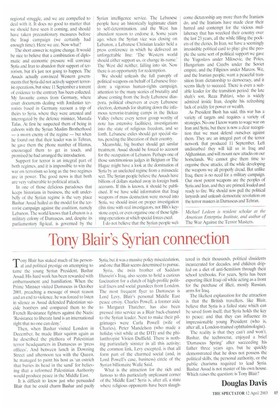Tony Blair's Syrian connection
T°nYBlair has staked much of his personal and political prestige on attempting to tame the young Syrian President, Bashar Assad. His hard work has been rewarded with embarrassment and humiliation. When the Prime Minister visited Damascus in October 2001, preaching a message of sweet reason and an end to violence, he was forced to listen in silence as Assad defended Palestinian suicide bombers and compared them to the French Resistance fighters against the Nazis: 'Resistance to liberate land is an international right that no one can deny.'
Then, when Bashar visited London in December. he made Blair squirm again as he described the plethora of Palestinian terror headquarters in Damascus as 'press offices'. And between lunch in Downing Street and afternoon tea with the Queen, he managed to paint his host as 'an ostrich that buries its head in the sand' for believing that a reformed Palestinian Authority would produce peace in the Middle East.
It is difficult to know just who persuaded Blair that he could charm Bashar and pacify Syria, but it was a massive policy miscalculation, and one that Blair seems determined to pursue.
Syria, the twin brother of Saddam Hussein's Iraq, also seems to hold a curious fascination for a clutch of high-profile political fixers and social grandees from London. The most frequent flyer to Damascus is Lord Levy, Blair's personal Middle East peace envoy. Charles Powell, a former aide to Margaret Thatcher, has also been pressed into service as a Blair back-channel to the Syrian leader. Next to make their pilgrimages were Carla Powell (wife of Charles), Peter Mandelson (who made a holiday visit while at the DTI) and the philanthropist Vivien Duffield. There is nothing particularly sinister in all this activity: the common link, Levy excepted, is that all form part of the charmed social (and, in Lord Powell's case, business) circle of the Syrian billionaire Wafic Said.
What is the attraction for the rich and famous to this particularly unpleasant corner of the Middle East? Syria is, after all, a state where religious opponents have been slaugh
tered in their thousands, political dissidents incarcerated for decades, and children dripfed on a diet of anti-Semitism through their school textbooks. For years, Syria has been exporting illicit Iraqi oil while acting as a front for the purchase of illicit, mostly Russian, arms for Iraq.
The likeliest explanation for the attraction is that the British travellers, like Blair. believe that Syria is a failed state which can be saved from itself; that Syria holds the key to peace; and that they can influence its impressionable young President (who is, after all, a London-trained ophthalmologist).
The reality is that they' can't and won't. Bashar, the technocrat, enjoyed a brief 'Damascus Spring' after succeeding his father three years ago, but he quickly demonstrated that he does not possess the political skills, the personal authority, or the public charisma required to lead Syria. Bashar Assad is not master of his own house. Which raises the question: is Tony Blair?
Douglas Davis
THE SPECTATOR 12 April 2003


































































 Previous page
Previous page